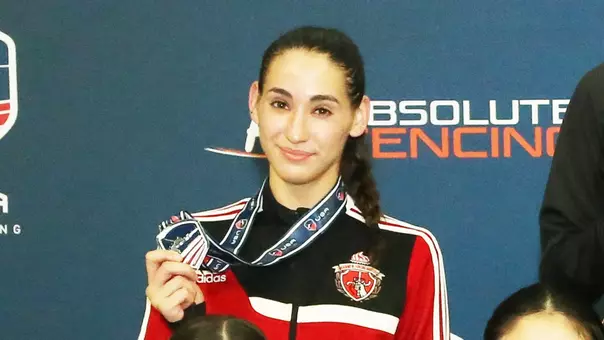Princeton University Athletics
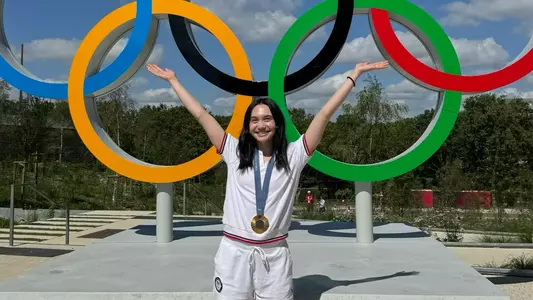
Golden Feature: Maia Weintraub
September 24, 2024 | Women's Fencing
Third In A Series On Princeton's Gold Medalists From The Paris Olympics
Click HERE for Hannah Scott
Click HERE for Nick Mead
Maia Weintraub is a stranger. She doesn’t know me; I don’t know her. She is standing outside of Firestone Library, our prearranged meeting point, asking random people if they’re the one she’s supposed to be meeting.
Finally she turns in my direction. I sort of recognize her from her photos, and I’m pretty sure that this is the right person. We then say the first words we’ve ever spoken to each other: “Maia?" from me to her, and “Hello” from her to me.
In another 15 minutes or so, she’s sitting on a bench in the courtyard at Chancellor Green. She’s been talking about herself, her summer and her sport. We've just met, obviously, and yet I already feel like I know her well enough to give her something of a quizzical look when she talks about how, in fencing, you “have to have that fire in you.”
Fire? Her? This person sitting next to me, the one who has never spoken more than slightly above a whisper and who has given off a slightly nervous laugh at the discomfort of talking about herself for so long? And now she wants me to believe that she morphs into something unrecognizable when she’s on the fencing strip?
“In fencing, a lot of times when you score a point, you scream or yell,” she says. “A lot of it is to expel tension, and maybe sway the referee, who makes the final decision on scoring. A lot of times people yell and scream.”
Yeah, no. I’m having a hard time picturing this. In fact, I’m struck by the way someone can talk about yelling and screaming and do so in such a soft, almost fragile voice.
“When I was growing in the sport, it was a big thing that my coach and I worked on,” she says.
Now that’s something that I can picture. A fencing coach, and a fencing prodigee, taking time away from the nuts and bolts of what it takes to win points to work on something that comes naturally to most — yelling and screaming.
“It didn’t come easily to me,” she says.
The more she talks about yelling and screaming, the more she laughs. It’s hard for me not to laugh as well, the juxtaposition so obvious.
“It’s funny when my friends watch me in competition and see that side of me,” she says. “They can’t believe that I am the same person. But hey, in elite sport, you have to have that fire in you.”
It doesn’t get more elite than Maia Weintraub. The almost docile young woman on the bench can turn it on with the best of them, anywhere in the world. There have to be two Maias.
How else would you explain her Olympic gold medal?
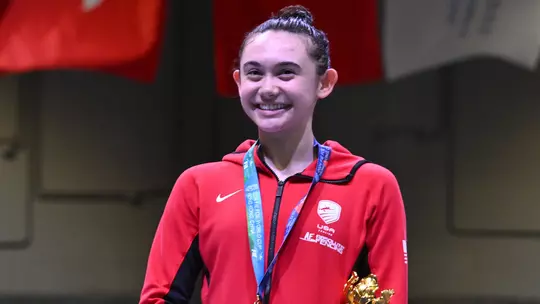
There are four athletes on each side for team fencing events. Of those four, a match starts with three from each team, with the fourth a substitute. In every other team event anywhere in the world, teams can substitute freely, with the fourth fencer able to go in and out and any of the first three able to reenter as well.
Ah, but then there are the Olympics. In the team fencing events at the Olympic Games, you can sub only once in the entire tournament, and once you put that fourth fencer in, then the one who came out cannot go back in at any time during the remainder of the Games. Not that match. The entire Olympic tournament. This makes coaches hesitant to change up the lineup, because once you do, a subsequent injury would mean a team forfeit.
Oh yeah, and there’s something else. If you are a fencer who does not compete at all in any of the matches, then you do not receive a medal even if your team wins one.
All this take us to the women’s team foil tournament at the Paris Olympic Games this past summer, the entirety of which was contested in one day, Aug. 1. The United States team had this lineup: a top three of Jacqueline Dubrovich, Lee Kiefer and Lauren Scruggs and the No. 4 fencer, Maia Weintraub.
The U.S. first defeated China 45-37 in the quarterfinals. Weintraub did not compete. Next up? A 45-31 win over Canada in the semifinals. Still no Weintraub.
“This all goes back to team bonding,” Weintraub says. “Everyone knows this rule is in place, and it’s an extra challenge for the person in the fourth spot. I had to be ready to go in at any time, but I also didn’t know if I’d fence at all. That was an added factor of stress. You have to be ready if the team needs you, and you have to control your emotions if they don’t.”
Those two wins earned the U.S. a spot in the finals against Italy. It also guaranteed medals for Dubravich, Kiefer and Scruggs, the latter two of whom had gone gold-silver already in the individual event. As for Weintraub, unless she made an appearance in the final, there would be no medal.
“Team dynamics matter,” she says. “The team energy can be impacted by these outside factors. The team had won its semifinal and was going to win a medal. I wasn’t even thinking that I hadn’t fenced yet. I just remember being ecstatic that the team was in the final. We all cried actually.”
There were about four hours between the end of the semifinal match and the start of the final.
“The coach came up to me and said ‘no matter what you will fence in the finals,’” she says. “In the moment, I was thinking that no matter what I’d be ready to do my job, but it was a very nice thing to hear. I was ready for the moment I went in.”
Uh, yes, she was.
There was actually a time when not all three weapons had a team event in each Olympic Games and instead had a rotation. Had that been the case, it’s possible that there wouldn’t have been a team foil in Paris. Now, though, each weapon has its individual and team events.
Women’s team foil dates back to the 1960 Olympics, and in all that time the USA had never won gold. Italy had. In fact, the Italians had four of the previous six gold medals in the event, going all the way back to 1992.
The match figured to be a toss-up. Team events feature nine head-to-head bouts, called “relays.” Weintraub made her first appearance in the fifth relay, which, if nothing else, meant she would win at least a silver medal.
The U.S. was ahead 19-15 when Weintraub began to fence. Her opponent was Arianna Errigo, whose resume includes three Olympic medals (one gold) and 10 World Championships. Errigo gave birth to twins in 2022 — and came back a year later to finish second at the World Championships. She carried the Italian flag at the Opening Ceremonies.
“She’s a legend,” Weintraub says. “She’s one of the greatest fencers ever. I will say it’s a bit crazy to think that your Olympic debut would be on the finals strip, under the lights, with everyone watching. Knowing I was going up against her for the first match, there were a lot of nerves. For the first few touches, I was trying to be too perfect. But I knew my teammates had faith in me, and I’d been fencing for 14 years. I remember when I went out on the strip, for some reason it seemed bigger and my opponent seemed further away.”
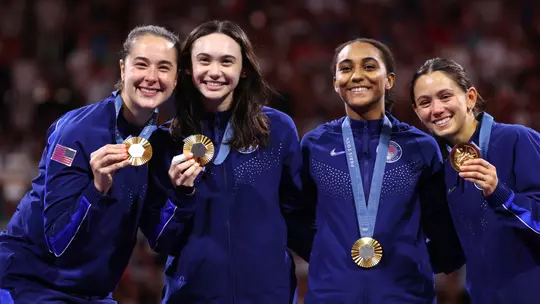
Maia Weintraub’s mother is from Singapore. Her father is from Detroit. They met on a long airplane ride, from Singapore to London, when they were randomly seated next to each other. He is an etymologist who was doing field work in Indonesia and was headed back to London. It was about a quarter of the way into the 14-hour flight when they started talking.
Fast-forwarding, they settled in Philadelphia, where her mother is a Penn-educated lawyer, and Maia is their only child. When she says she lives in Philly, she means it.
“Most people who say they live in Philadelphia actually live in a place like Cherry Hill,” she says, referring to the New Jersey town across the river. “We live two blocks from Independence Hall.”
She has two uncles who fenced at Harvard, and they introduced her to the sport when she was seven. She also played soccer, did ballet and went to learn Chinese on Saturdays.
“When I started to take to fencing well, my father invested more in it for me,” she says. “It started with local competitions every weekend, and then regional and then national.”
Her first international competition came when she was 13. Like all great fencers, she outgrew her first passport at a young age.
“I ran out of pages on my first one,” she says. Keep in mind, she’s still only a junior in college.
So where has she been? To name a few: France, Germany, Italy, Hungary, Georgia, Serbia, China, Japan, Korea, Peru.
“I think Peru might have been my favorite,” she says. “I didn’t realize there was a Peruvian/Japanese fusion, but there is. The food was great. I’ve been studying Spanish, and I love to be able to practice speaking. We don’t get to too many Spanish-speaking countries.”
One of her shorter trips was from Philadelphia to Princeton, where she won the NCAA individual foil championship her freshman year and then followed that with a third-place finish as a sophomore. She took last year off from school to hopefully qualify for the Olympics.
To do so meant navigating the rigid selection system. It’s all based on points, which are accumulated through fencing in events from October all the way to May, with the top three points finishers’ advancing to the individual competition and the fourth to the team roster. Weintraub finished fourth — barely. It wasn’t until the final event in Tibilisi, Georgia, that she secured her place.
“It was a long and stressful period,” she says. “I remember once the competition ended and I realized that mathematically I had made the team, it really took a while to set in. I remember it as an idea and a dream to be on the team. When it actually happened, I didn’t realize it was a reality. It wasn’t until I came back home to school and my friends that I could feel I had made it.”
The U.S. Olympic fencing team spent some pre-Olympic time at the training center in Colorado Springs before heading to, of all places, Peru for the Pan Am Championships.
“It was all important for team bonding,” she says. "I really believed you could have four amazing fencers, but if they don’t bond and have team cohesion, it’s not going to work out. The idea that the whole can be greater than the parts is really, really true.”
It was July 20 when the team left for Paris.
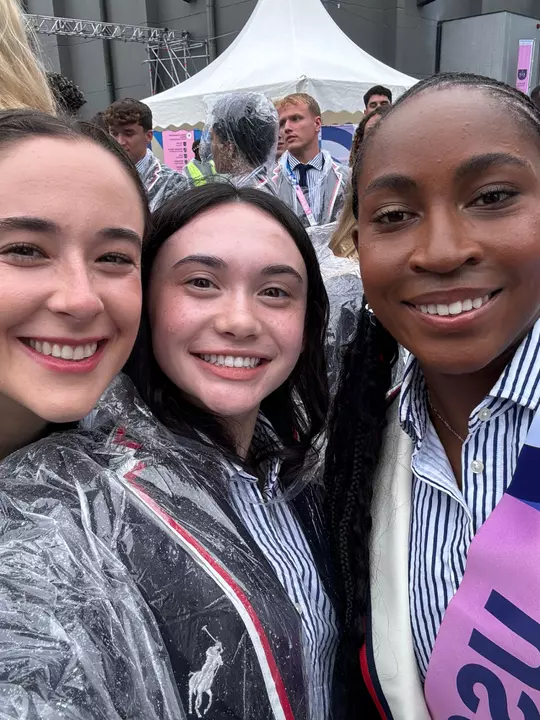
Maia Weintraub is all smiles, even with the rain at the Opening Ceremonies. So are the other two people in the picture. To Weintraub’s right is Dubrovich, her foil teammate. Her smile goes ear-to-ear.
Then there is the woman to Weintraub’s left. She is also smiling. While she wouldn’t win a medal, she did carry the U.S. flag at the Opening Ceremonies. Perhaps you recognize her. Who is she? Her name is Coco Gauff, the tennis player. She is also smiling widely. This is part of what the Olympics are all about.
“It was great to talk to the athletes from other sports,” Weintraub says. “I had an amazing conversation with Coco Gauff. At the end of the conversation, I realized I’d forgotten to introduce myself, so I said ‘by the way, I’m Maia,’ and she said ‘and I’m Coco.’ I high-fived LeBron James at the men’s basketball final. Oh, and I met Snoop Dog.”
She was there for business, though. And when it came time for her to take care of her business, she came through … eventually.
The U.S. led Italy 19-15 when she stepped in against Errigo. It was 19-18 three touches later.
“I had to let the nerves release,” she says.
That she did. By the time her relay was over, the U.S. lead was 25-19. It was an extraordinary turnaround, one made even more amazing considering the opponent. She went back out in the seventh relay, matched up with Italy’s sub, Francesca Palumbo. It was 30-25 USA at the start. It was 35-26 when she finished.
There were still two more relays to go. Italy outscored the U.S. 13-10 in those two, but the outcome was never really in doubt after Weintraub’s performance. The final score was U.S. 45, Italy 39. Take away Weintraub’s performance, and that score is the U.S. 34, Italy 34.
“It was an insane moment,” she says. “In the moment, it was outlandish to think about being an Olympic champion. Lee and Jackie started fencing at a time when we couldn’t have dreamed of winning the Olympics. Lauren and I are younger. There’s a seven or eight year age gap between us. It’s a different perspective that we brought to the team. I think it hit Lee and Jackie harder. It was amazing to have done this as a team. Winning a medal as an individual is a great achievement. Doing it as a team, those are memories you can share together for life.”
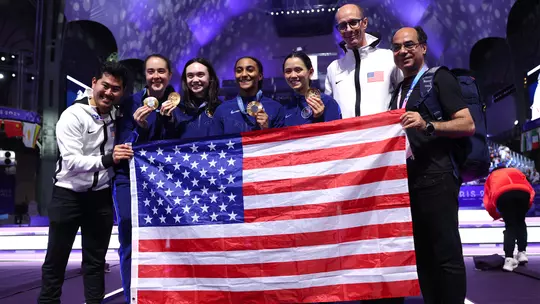
Maia Weintraub is 21. Or maybe she’s 42? Could there actually be two of her in one? Her resume includes an NCAA individual championship and an Olympic gold medal, and yet sitting here on the bench, she doesn’t really consider herself to be either one of those.
“When I’m fencing, I take on a different persona,” she says. “In a fencing setting, in that bubble, it feels significant. When I won the NCAAs, in the NCAA hall, I thought ‘I’m an NCAA champion.’ Once I left, though? I was just Maia Weintraub. The Olympic podium was pure emotion. My team. The flag. The medals. Once I left there, once I went on vacation, I felt like my same old student self. I like being able to have that disconnect from the fencer and the person.”
She’s back at Princeton now, back in pursuit of her degree in Ecology and Evolutionary Biology. Like most EEB majors, she’s on a pre-med track. She’s also back on the Princeton fencing team. She’s likely to try to qualify for the 2028 Olympics in Los Angeles as well.
“Honestly, it feels surprisingly normal,” she says. “I’ve been asked a lot what it’s like being back on campus, and the word that comes to mind is ‘normal.’ I get occasional recognition, which is very strange for me. The one time people watch fencing is during the Olympics. The number of people, non-fencers especially, who said they watched the fencing event surprises me and makes me happy. Maybe winning a gold medal has helped expand the scope of the sport.”
When she fences again for Princeton, she’ll join a very exclusive list of Olympic gold medalists who came back to compete as Tigers. How exclusive? Robert Garrett (1896 two-time track and field gold medalist), Bill Bradley (1964 men’s basketball gold medalist), Ashleigh Johnson (2016, 2021 women’s water polo) and Sarah Fillier (2022 women’s ice hockey).
She laughs when she’s told of this exclusive club that she’s joined. There really are two Maia Weintraubs, the athlete Maia and the regular Maria. Here, outside of Chancellor, she’s regular Maia.
Now she’s gotten up and said goodbye. As she starts to walk away, Regular Maia has one last thing to say. After she won her gold medal but before she returned to campus, she went on a vacation, to Mallorca and Barcelona.
“You know,” she says, “when people I don’t know well ask me how my summer was, I just tell them that I went on vacation to Spain.”
Of course she does. The gold medal? That’s for the other Maia.
— by Jerry Price












